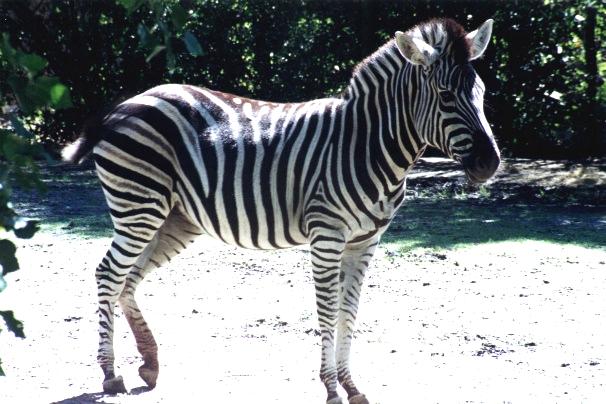Equus burchelli (Plains Zebra) -BIO203
Reproduction and Captivity
The normal gestation period of a plains zebra is 360-396days. After birth foals are able stand and nurse within minutes and run within an hour which is essential to avoid predation, as 50% of foals are eaten by predators within the first year. It is common for mares to become pregnant during their foal heat so they are essentially caring for two at once. Though foals are able to eat grass within a week of birth they are not completely weaned until 7-11 months of age, the weanlings will then stay with the heard until 2-3 years of age (Colvin & Nihranz, 2009). Males leave and form bachelor herds until they can find a harem of their own. Females will stay with her original harem until her first oestrus. During her first oestrus the young female will attract potential mates by assuming a stance with her head up and hind legs spread with her tail in the air. While in this stance she will urinate attracting potential mates (Pluhacek & Bartos, 2000). While females display this behavior bachelor males will try to abduct her from her harem, her father will attempt to fight them off but ultimately will be unsuccessful. Females do not ovulate on their first oestrus and do not copulate. Females may change harems at this time but after copulation she is with that male and the rest of his harem for life. The first female impregnated will become the dominant mare.

Photo: A healthy mature female zebra.
Occasionally
a young male may take over an older male’s harem. Studies of
captive plains zebras have shown that the introduction of a new male to
a harem can be dangerous for pregnant females and foals less than one
year of age (Pluhacek & Bartos, 2000). This is because plains
zebras are known to practice infanticide and feticide. After
taking over harem males can gain reproductive advantage by killing foals
that have yet to reach peak lactation and forcing pregnant mares to
abort (Pluhacek &
Bartos, 2005) Males will force pregnant mares to abort via
force copulation or by severely injuring the mare. Mares
have a higher chance of getting pregnant by the new male if she
isn’t nursing a foal.